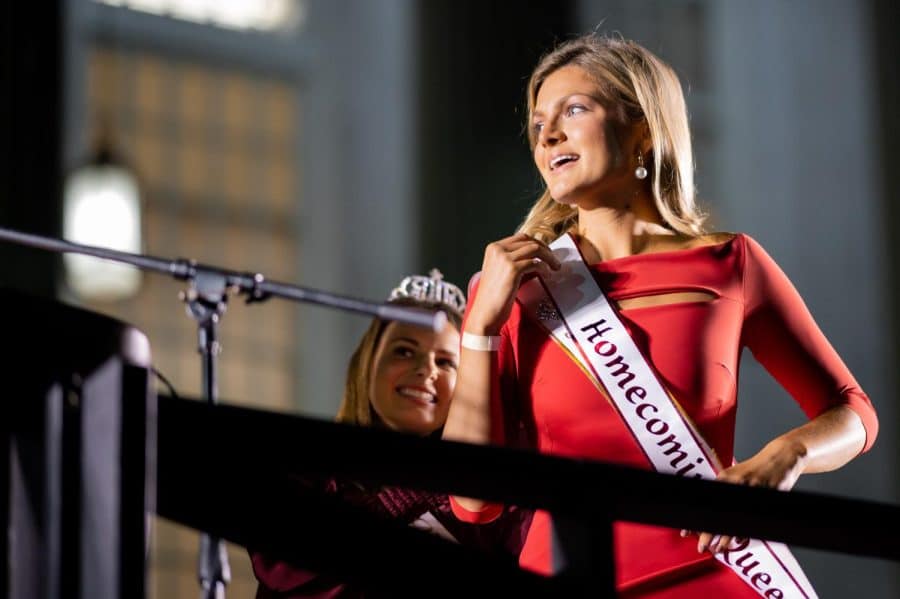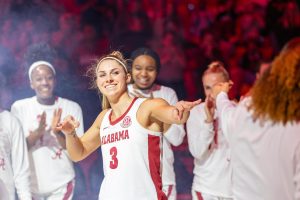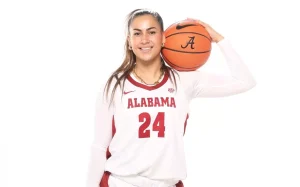Administrator responds to homecoming elections, supports redraft of rules
McLean Moore is named homecoming queen at the annual pep rally and bonfire on Oct. 22, 2021.
October 30, 2021
Vice President for Student Life Myron Pope sent an email to the student body on Saturday to address “misinformed narratives” about the homecoming election.
This email came after The Crimson White reported multiple potential election violations committed by the Elections Board and McLean Moore, who was crowned homecoming queen on Oct. 22.
Pope commended the students on the homecoming court and those who organized homecoming events.
“Unfortunately, misinformed narratives about our homecoming queen election process have emerged over the past several days, and some students were unfairly pulled into these narratives,” Pope wrote. “It is important to me that you, our student body, have the accurate information.”
Pope did not discuss the contents of his email with The CW before sending it to the student body and declined a follow-up interview. The Student Government Association has not released a statement about the homecoming election.
Timeline
The Elections Board did not publish the homecoming election timeline at least 21 class days in advance, which invalidated it from the beginning.
The Elections Board postponed a special senate election for this reason, but neglected to apply the same policies to the homecoming election.
Pope did not address the inconsistency in his email on Saturday.
UA students Garrett Burnett, Sarah Shield and Jack Kappelman submitted an appeal for judicial review on Oct. 27.
“The Student Elections Board disregarded the timeline error for the Homecoming Queen election but rescheduled the election for the SGA Senate vacancies on the same grounds thus indicating that it was aware of the violation,” they wrote.
Election results
In his email, Pope claimed that the SGA posted the homecoming results in accordance with the Elections Manual, which is not true.
Pope confirmed that the Elections Manual calls for posting the official results “three days after the election.”
While Moore was crowned queen three days after the election, official results — with a breakdown of votes per candidate — were not released until six days after the election on Oct. 25.
Financial disclosures
Pope claimed that “all financial disclosure form submission deadlines were met by all candidates.” During campaigns, The CW reported potential violations from multiple candidates.
As of Oct. 16, Moore had submitted one financial disclosure form on Oct. 4. Her second financial disclosure form should have been publicly available, according to the Elections Manual, by Oct. 13 at the latest. It remained missing at least through Oct. 16.
Moore failed to report campaign materials, including professional-quality campaign videos.
Candidates are required to report total expenditures, including monetary or in-kind contributions. If campaign materials are free or donated, candidates are required to estimate the fair market value of the contribution.
“Several candidates submitted forms with errors, and the Elections Board returned those forms to the respective campaigns to allow them to correct the errors and re-submit,” Pope wrote. “All errors were determined to be unintentional.”
Modifying a form is considered an intermediate violation in the Elections Manual.
Pope wrote that “all errors were determined to be unintentional,” but did not provide details about who deemed those errors unintentional. According to the Elections Manual, intent is not required to determine minimal, minor or intermediate violations.
The Elections Board and chair Reese Caldwell did not respond to The CW’s combined 10 requests for comment.
Infractions
Pope reported that only one infraction against Moore was reported to the Elections Board. The Elections Board did not supply information about infractions to The CW after requests on Oct. 26.
“The elections board promptly met to review the report, which was dismissed due to insufficient evidence,” Pope wrote. “No other alleged infractions were submitted to the elections board concerning Ms. Moore or her campaign. Ms. Moore received zero infraction points and there were never grounds for potential disqualification.”
Multiple candidates’ actions during campaigns could have been deemed violations if reported to the Elections Board.
Runoff election
Moore received 47% of votes, with 300 votes separating her and runner-up Montana Fouts.
Pope wrote in his email that the Elections Manual “only calls for a run-off for executive SGA offices, which homecoming queen is not.”
The Elections Board, in its homecoming election timeline, listed Thursday, Oct. 21 as the date for a runoff election if necessary.
The Elections Manual, which includes guidance for homecoming elections, outlines two policies for runoff elections.
Executive elections, which involve a student body vote like homecoming queens, require a majority vote to win. The other policy for senate elections, which are voted on by students in a particular college and result in multiple winners, requires a tie for a runoff.
The manual defines a majority as “fifty percent of the votes cast plus one additional vote.” If no candidate receives a majority, “a run-off election shall be conducted no sooner than two class days following the election, but not later than ten full class days after the election, for the two candidates that receive the largest percentage of votes cast.”
Task force
Pope wrote that several aspects of the Elections Manual were “not written with homecoming queen in mind.”
The Elections Manual applies to fall and spring elections. The Elections Board confirmed in the committee’s only response to The Crimson White on on Oct. 26 that homecoming elections are considered fall elections, which would subject them to policies outlined in the manual.
In his email, Pope called for the creation of a “diverse student task force” to draft clear rules for homecoming elections in the future.





















